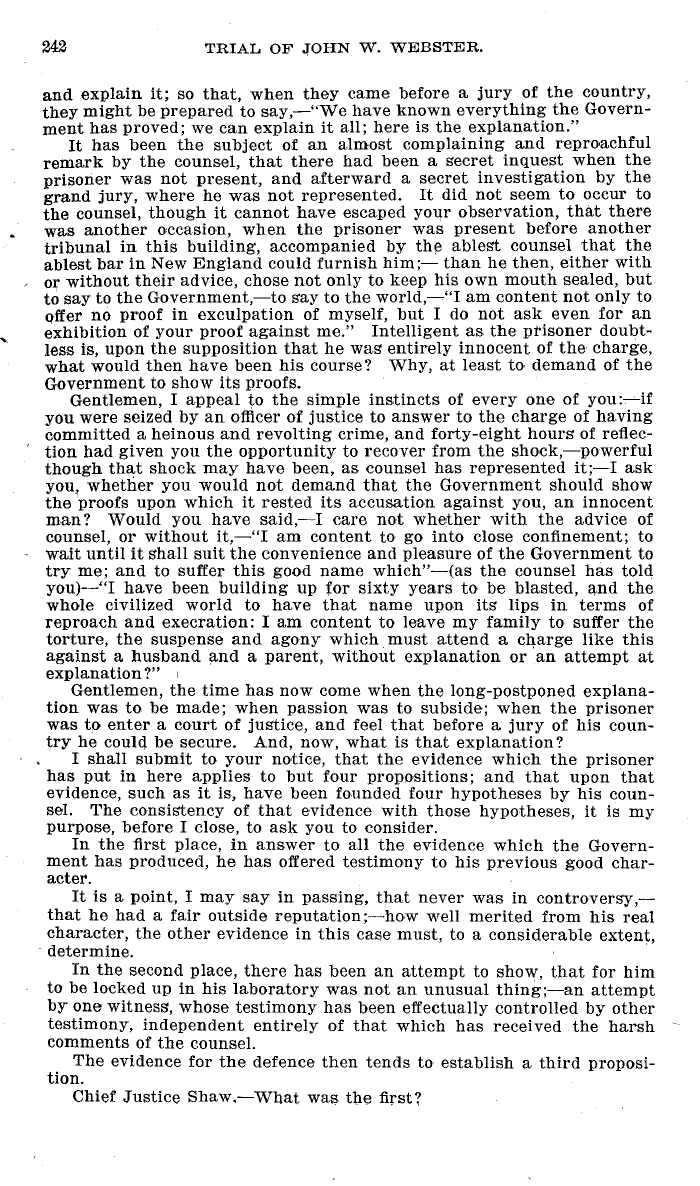|
242 TRIAL OF JOHN W. WEBSTER.
and explain it; so that, when they came before a jury of the country,
they might be prepared to say,-"We have known everything the Govern-
ment has proved; we can explain it all; here is the explanation."
It has been the subject of an almost complaining and reproachful
remark by the counsel, that there had been a secret inquest when the
prisoner was not present, and afterward a secret investigation by the
grand jury, where he was not represented. It did not seem to occur to
the counsel, though it cannot have escaped your observation, that there
was another occasion, when the prisoner was present before another
tribunal in this building, accompanied by the ablest counsel that the
ablest bar in New England could furnish him; than he then, either with
or without their advice, chose not only to keep his own mouth sealed, but
to say to the Government,-to say to the world= "I am content not only to
offer no proof in exculpation of myself, but I do not ask even for an
exhibition of your proof against me." Intelligent as the prisoner doubt-
less is, upon the supposition that he was entirely innocent of the charge,
what would then have been his course? Why, at least to demand of the
Government to show its proofs.
Gentlemen, I appeal to the simple instincts of every one of you:-if
you were seized by an officer of justice to answer to the charge of having
committed a heinous and revolting crime, and forty-eight hours of reflec-
tion had given you the opportunity to recover from the shock,-powerful
though that shock may have been, as counsel has represented it; -I ask
you, whether you would not demand that the Government should show
the proofs upon which it rested its accusation against you, an innocent
man? Would you have said,-I care not whether with the advice of
counsel, or without it,- "I am content to go into close confinement; to
wait until it shall suit the convenience and pleasure of the Government to
try me; and to suffer this good name which"-(as the counsel has told
you)-"I have been building up for sixty years to be blasted, and the
whole civilized world to have that name upon its lips in terms of
reproach and execration: I am content to leave my family to suffer the
torture, the suspense and agony which, must attend a charge like this
against a husband and a parent, withot explanation or an attempt at
explanation?"
Gentlemen, the time has now come when the long-postponed explana-
tion was to be made; when passion was to subside; when the prisoner
was to enter a court of justice, and feel that before a jury of his coun-
try he could be secure. And, now, what is that explanation?
I shall submit to your notice, that the evidence which the prisoner
has put in here applies to but four propositions; and that upon that
evidence, such as it is, have been founded four hypotheses by his coun-
sel. The consistency of that evidence with those hypotheses, it is my
purpose, before I close, to ask you to consider.
In the first place, in answer to all the evidence which the Govern-
ment has produced, he has offered testimony to his previous good char-
acter.
It is a point, I may say in passing, that never was in controversy,-
that he had a fair outside reputation; how well merited from his real
character, the other evidence in this case must, to a considerable extent,
determine.
In the second place, there has been an attempt to show, that for him
to be locked up in his laboratory was not an unusual thing; an attempt
by one witness, whose testimony has been effectually controlled by other
testimony, independent entirely of that which has received the harsh
comments of the counsel.
The evidence for the defence then tends to establish a third proposi-
tion.
Chief Justice Shaw.-What was the first?
|

